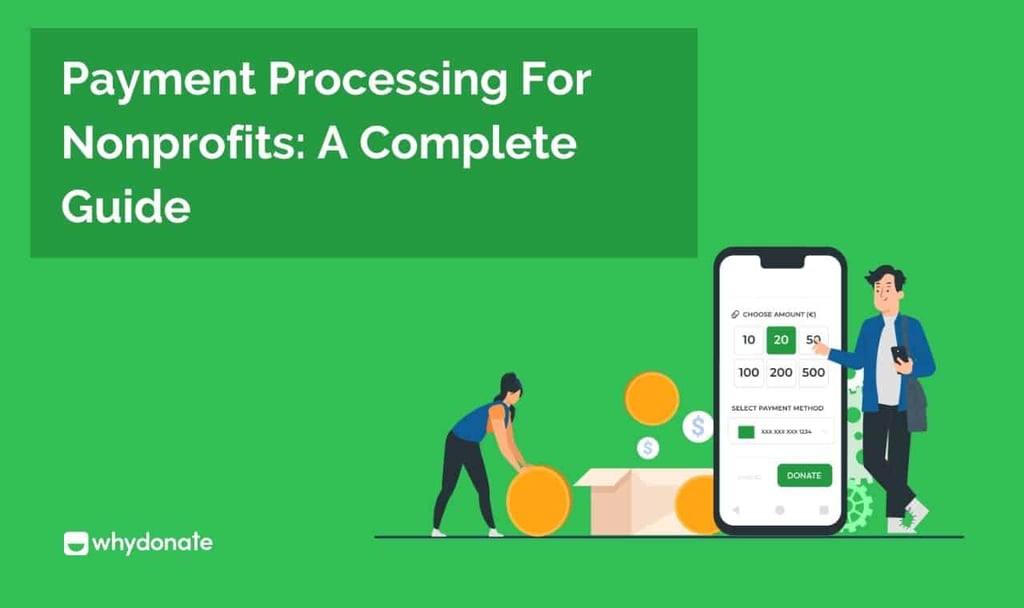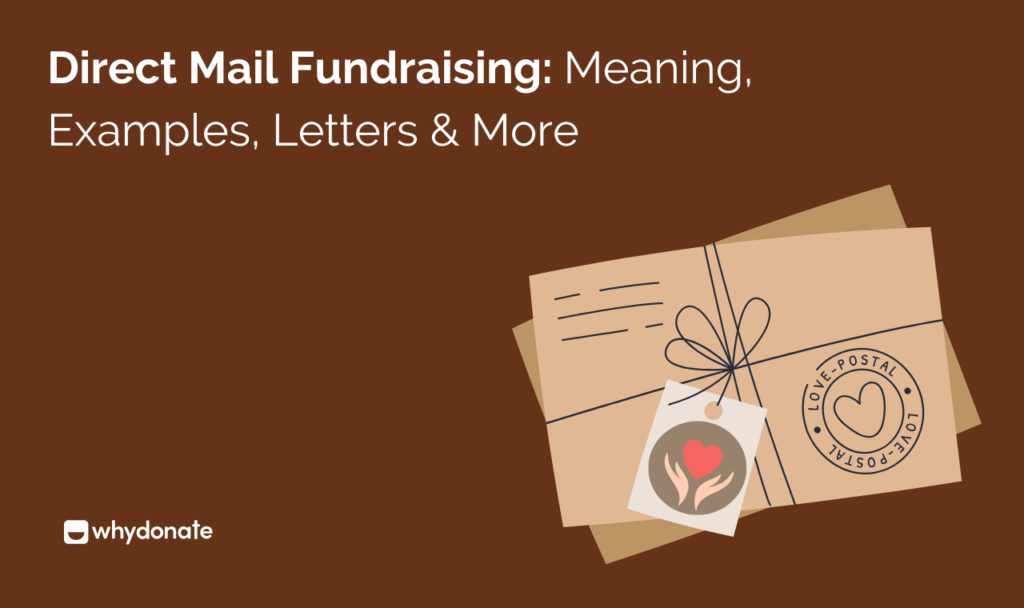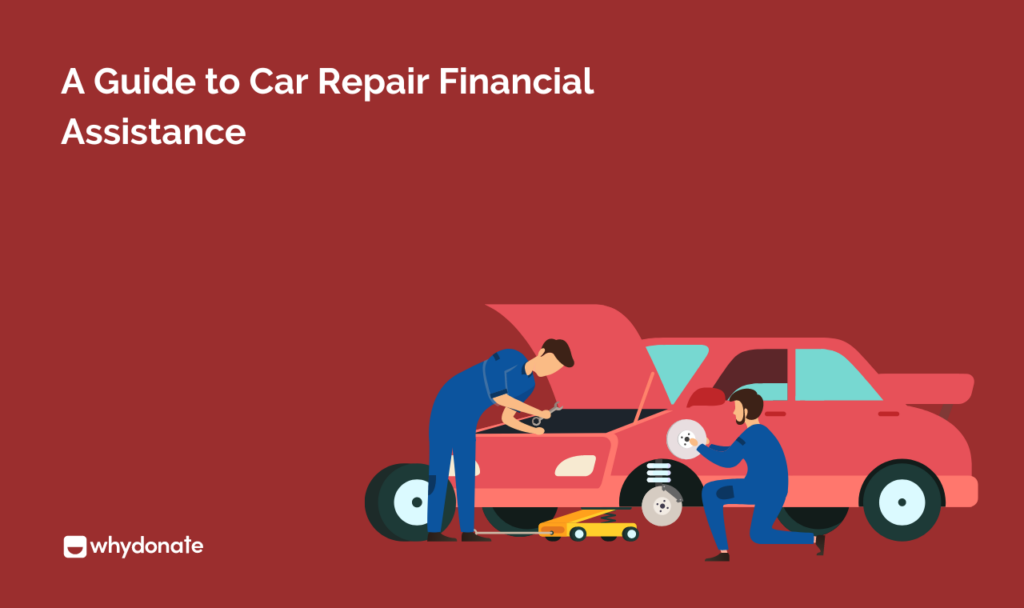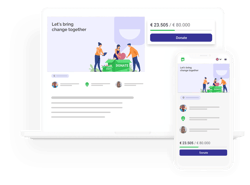Table of Contents
What Is A Payment Processor?
A payment processor is needed to process donations online. Payment processors can help boost a nonprofit’s funds and increase its donor outreach. It can also help manage the financial details of its donors, such as their credit card information. Payment processing for Nonprofits is used to handle various types of transactions, such as registering for an event or purchasing merchandise.
However, many smaller nonprofits do not require one due to the rapid growth of the online giving industry. Most of the European Union countries have their own payment methods, and the payment service providers aggregate these payment methods accordingly. It is crucial to offer these payment methods as a charity.
Streamline your donations with our efficient and diverse payment methods. Start your fundraising campaign today!
Most Used Payment Methods For Nonprofits
1. Credit Cards For Nonprofits
Today, almost everyone has a credit/debit card (Visa/Mastercard/American Express), and it’s easy to use one to donate online. Some payment processors do not charge fees for credit card transactions. Most organizations also accept credit or debit cards. Nonprofits can also offer both debit and credit card payment options to their donors. These types of tools make it easier for people to give and manage their finances.
2. Stripe For Nonprofits
Stripe is another star payment gateway that enables nonprofits as well as corporates to send and receive funds from their donors’ bank accounts. It accepts in-person or online payments for non-profits and has a predictable payout timetable. The company charges 2.2% + $.30 per in-person or online transaction for all eligible organizations.
3. PayPal For Nonprofits
Electronic commerce company PayPal enables individuals and businesses to make payments through online transfers. After establishing a PayPal account, the customer can start sending and receiving payments, and the proof of funds can then be confirmed by either their credit card or checking account.
4. Giropay
Giropay is a type of payment that allows individuals and businesses to make payments online using their bank accounts.
5. iDeal
In the Netherlands, iDEAL is a payment system that allows people to make payments online without having to provide their credit card information. Instead of having to enter this information, you can pay with iDEAL through your online banking website. It’s a fast and simple way to transfer money without having to gather all the necessary details.
6. Sofort
In Europe, Sofort is a popular real-time bank transfer payment method that enables businesses and individuals to make payments online.
7. Bank Transfer
Unlike other types of payments, bank transfers are simple and do not require a specific setup process to allow a business to accept payments. This method is ideal for small and medium-sized businesses as it doesn’t require them to have specific requirements.
8. SEPA Direct Debit Payment
The goal of the Single Euro Payments Area (SEPA) is to make European payments more convenient and cheap. It focuses on all euro-denominated transactions.
How Does Online Non-Profit Payment Processing Work?
-
Starts With A Donation
Online donations and purchases made by supporters of a nonprofit organization are processed through a non-profit payment processing system. This process can be done through various methods, such as donations to crowdfunding campaigns, purchases of tickets, membership, or merchandise. However, all donations made without cash or checks must be verified before the funds can be released to the public. When a donor makes a donation through an online service, their credit or debit card information is required to be entered.
-
Information Received By The Payment Gateway
After the card has been verified, the transfer process begins, and the donation goes to a merchant account, which is typically a bank account. In order to be verified, the donor must input valid bank account details for the payment processing. Many nonprofits can also open a merchant account through their regular bank, though some payment processors, such as PayPal, have their own accounts that allow them to process donations.
-
Donations Received
After a donation has been verified, the payment processor will then start the transfer process. The funds will then go to the merchant account of the nonprofit. The Nonprofit receives the donation and allows them to use it.
-
Information Stored Securely In Non-Profit Database
After the transaction is made, all the details of the donor are received and stored in the backend database, which includes the name, address, bank account number, phone number etc.

Why Do Nonprofits Need A Payment Processor?
Nowadays, people moreover prefer to donate online rather than doing it physically. Payment processors can help receive donations seamlessly and also quickly from potential donors. For many small nonprofits, payment processors can be a plus point as they can make themselves visible online and accept donations regardless of geographical location.
Basically, payment processors are tools that help nonprofit organisations accept donations and deposit them into their bank accounts. A payment processor can also help them manage their membership fees, register for events, and buy merchandise through their online store. Nonprofits rely on this type of tool to collect donations and manage their finances.

-
Accepting Donations
Although many smaller nonprofits may not need a payment processor, they should still consider using one if they wish to accept online donations. There are several payment processors that can help small organisations lower their costs.
Getting started with online donations can be very challenging for many nonprofits. Having a payment processor can help them collect donations online and manage their donor information. It can also help boost their donations through various fundraising tools, such as donation plugins and peer-to-peer campaigns.
-
Collecting Membership Fees
Nonprofit supporters can also support by joining a membership program, and most of them have a monthly or yearly fee. Having a convenient payment processor is very important to ensure that you can collect these fees. With a proper payment processor, your most frequent and recurring supporters can donate online without any difficulties.

-
Selling Merchandise Or Event Tickets
Nonprofits also sell products online, such as printed T-shirts, mugs, bags etc., to raise more funds. Having a payment processor will allow them to accept payments in the most secure manner. This will enable them to reach out to more potential donors and increase their budget.
Again, one of the most frustrating aspects of organizing a fundraising event is trying to sell enough tickets. These will help nonprofits to accept donations and ticket payments online easily.
Payment Processing Fees
A payment processing fee is a cost that an organization must pay to process a transaction. Depending on the service provider, it typically ranges from 0.5% to 8%. This fee is generally charged to the merchant from a few different parties in a transaction. In some cases, it is a set amount of around €0.25 per transaction, while in most cases, it’s a percentage + this set amount.
Through a partnership with a merchant-acquiring bank, a merchant can process all of the electronic payments needed in a transaction. They also establish a merchant account with the bank, which serves as their primary deposit account. Other than the regular transaction fee, there are sometimes other charges, such as PCI compliance fees, annual/monthly service fees, and chargeback fees, that can be taken into account.

Popular Terms While Making Online Donations
Nonprofits offer several kinds of options to their donors for their convenience, and here are some terms that you may not be familiar with –
-
Online Donation Form Plugin
Regardless of the method that your donors use to give, most of them will end up in the same place as you when it comes to making a donation: your online form. This is important to make the fundraising process as simple and secure as possible.
A simple design and a secure donation form are two of the most important factors you should consider when making a donation online. Having both of these features will help create a secure and easy environment to use.
-
Aggregators
Aggregators are tools that allow organizations to process virtual transactions without having to set up their own merchant accounts, such as Mollie or Stripe. One of the main advantages of using an aggregator is that it’s effortless to set up.
Also, since they’re cost-effective, they’re usually the best option for small businesses. However, even if they’re easy to use, they can be prone to security issues. Many of them have caps on deposits, which can make them less secure.

Expert Tips For Nonprofit Donation Processing
- The goal of a payment processing system is to make it easy for a nonprofit to accept donations online. Having a well-designed and easy-to-use system can help keep donors coming back.
- It is highly essential to have a strong customer support service to assist your donors anytime they require help. It will show your dedication and ethics as a nonprofit if you are available for your valuable contributors.
- Maintain a sound CRM system to keep your data organised, which will help the nonprofit with future donations as well as keep track of their recurring donors.
- Even if you do charge payment processing fees from donors, you should be reasonable with the payment processing fee. A hefty amount can drive donors away.
- Data safety should be a priority. All donor data must be secured and kept within a well-maintained security system. Make sure to enable a firewall and restrict access to sensitive information.
- Allow users to choose from multiple options, such as credit/debit cards, bank transfers, and digital wallets while making online payments for non-profits.
- Make the entire process easy and simple so that donors shouldn’t give second thoughts while entering their information into the nonprofit donation processing page.
Make Your First Payment
When it comes to finding a suitable payment processor, nonprofits should understand their requirements first and opt for a multitasking solution for a long-lasting donor database and recurring donations.
WhyDonate offers a safe and affordable solution that doesn’t require any complicated process. Its low platform fee of 1.9%+ €0.25 helps boost the revenue of your organisation. Its 0% platform fee and flexible payment options also help lower the processing fees for your donors.
WhyDonate platform features a variety of options, such as a customizable donation page and a bouquet of assorted fundraising options. At WhyDonate, no technical setup is required for making donations as the team of WhyDonate handles all the technicalities.
Launch your campaign with flexible donation payment methods that fit your lifestyle.
Answering Popular Non-Profit Payment Processing FAQs
1. What’s the difference between an online donation tool and a payment processor?
An online donation tool is an all-encompassing solution with features like donor form, donation management, and reports designed to make fundraising easier. On the other hand, a payment processor is responsible for securely processing financial transactions and transferring money directly from the person who donated the funds to the organization.
Even though an online donor tool may be integrated with the payment processor to manage the transactional aspects, online donation tools offer more features specifically tailored to nonprofit organizations’ fundraising needs.
2. What features should my online payment processor have?
There are several vital features that a payment processor must have. When selecting an online payment processor, prioritize security, various payment methods, integration capabilities, support for recurring donations, mobile-friendliness, reporting tools, customization options, international payment support, transparent pricing, and reliable customer support.
3. Do nonprofits pay credit card processing fees?
Yes, nonprofits typically have to pay credit card processing fees when they accept donations or payments via credit cards.
4. What is payment fraud?
During any transaction, if any fraudulent activity occurs, it is said to be a payment fraud. It typically involves unauthorized access or use of someone else’s payment information, such as credit card details, bank account numbers, or digital wallet credentials, to initiate fraudulent transactions or transfers.

















